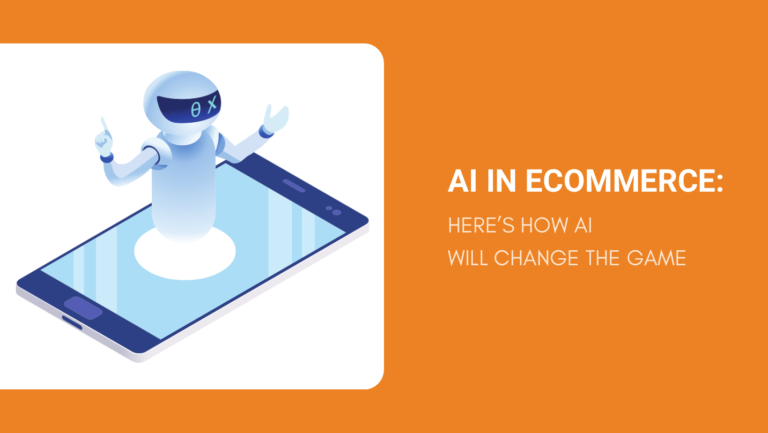Artificial intelligence is advancing rapidly, and the technology is set to reform major aspects of our lives.
The most prominent example is ChatGPT, released in November 2022, which turned out to be a complete game changer.
Although AI has been around for a while, this tool developed by OpenAI sparked countless debates worldwide on what the future of AI holds for us.
This also led digital entrepreneurs to wonder what change will AI bring to the eCommerce industry?
This article will shed some light on this question by addressing the rise and impact of AI in eCommerce, its practical applications, and some of its pros and cons.
So let’s dive straight into it!

What Is the Future of eCommerce with AI?
When you mention the word AI, the average person doesn’t think beyond a chatbot or Alexa on their phone.
In reality, today, AI in eCommerce is far beyond than just AI-powered virtual assistants playing your favorite songs.
AI covers a broad spectrum. Everything that involves data analysis and machine learning falls under AI’s umbrella.
In eCommerce, AI can analyze your current and past data, use it to construct accurate consumer behavior patterns, and help you make better decisions for the future.
AI will enhance user experience, replace manual technical labor, reduce fraud, and allow you to conduct in-depth competitor analysis.
The eCommerce industry will expand and competition will become even tougher.
Businesses refusing to adapt would become obsolete and slowly be replaced by their competitors that embraced AI.
The dawn of advanced AI-based tools has already taken the eCommerce world by storm.
Tools such as Zendrop now incorporate complete AI-based fulfillment systems.

Advantages of AI in eCommerce
The advent of AI has done wonders for the eCommerce industry. Here are some of its advantages:
Automated Customer Service
AI-powered customer support is expected to boost a company’s productivity by up to 40% by 2035.
This speaks volumes about AI’s impact on the customer support industry.
You can already see a major change in dynamics as many companies are now using chatbots to address basic customer concerns.
This has reduced the amount of investment required for customer support.
Automated Fulfillment Systems
Automated fulfillment systems take the burden of managing customer orders off of your shoulders.
There are full-fledged AI tools for fulfilling orders that eliminate most of the manual labor.
Auto-fulfillment tools have revolutionized the dropshipping industry in particular.

Smarter Marketing
Advanced AI means smarter marketing tools, and hence, more effective marketing strategies.
One key perk of using AI in marketing is gaining an in-depth understanding of what your target audience wants and giving them just that.
Automation in marketing minimizes human intervention in your day-to-day marketing practices. One example of that is automated social media marketing.
Detailed Metrics
Being able to track your user’s data, analyze it, detect potential improvements, and revise your strategies accordingly is the key to success in eCommerce.
AI can give you in-depth insights into what’s going on in your customer’s minds by monitoring their behavior.
As a result of using analytics, we’re looking at increased conversion rates, more sales, and an overall better user experience.
Personalized Customer Experience
Imagine how great it would be if your favorite brand customized its products/services according to your preferences.
A personalized experience is what every customer yearns for, and AI has been getting better at delivering it every year by utilizing big data.
The first stage is to identify what the customer wants by analyzing their interests, searches, purchases, inclinations, etc.
The second stage is to approach them with what they want and eradicate elements that may be out of their interests.
Advanced Search Engines
Search engines primarily incorporate AI to build algorithms for delivering the most relevant search results.
With the advancement in AI comes the advancement in search engines, meaning better and closer results to the user’s query.
Now search engines use external information of the user to determine what they’re searching for, which can be an advantage for online businesses.
Disadvantages of AI in eCommerce
The rise of AI might look promising, but it also comes with some rather terrifying drawbacks:
Unemployment
It is debatable whether AI will create more jobs than it destroys, but the labor class will undoubtedly witness a hefty gap.
Now that AI is advancing rapidly, virtual assistants, content writers, and customer support representatives are already getting replaced by bots and tools.
Though these tools will need human supervision, they will take over most jobs that require a low/mediocre level of technical knowledge.

Costly
Until AI takes over completely and the competition strengthens, don’t expect advanced AI tools to be affordable for small businesses.
Most of these tools can be quite costly since their development and maintenance require a great deal of technical labor.
Although it’s a risk-free investment, the more advanced and intelligent a tool is, the higher its cost would be.
Innovation Dies
AI is crossing boundaries we didn’t expect it to cross so soon.
However, human creativity is something AI cannot tap the surface of. No matter how smart it gets, it’s a man-made robot at the end of the day.
Being innovative and surpassing intellectual grounds is something AI will not be good at because it simply copies humans and does the same job faster and without errors.
Examples of AI in eCommerce
Contrary to popular opinion, AI has been embedded into the eCommerce industry for a long time.
The majority don’t notice how often they interact with AI whether they own an online business or regularly shop online.
So, what are some of the aspects where AI’s use in eCommerce has been significant? Let’s go over a few examples.

1) Fraud Detection
Ever since online shopping came into existence, frauds and scams in different forms have been a major concern.
Although merchants have figured out different ways to avoid deception in business, AI has made things even easier.
AI can detect unusual and suspicious customer activity by examining several factors, such as the number of orders, payment methods, IP addresses, and more.
It takes massive chunks of data and goes through it at a quick pace, identifies uncommon user behavior, and reports potential threats.
Although digital thieves employ various tactics to fool merchants, their patterns are almost the same.
This makes it easier for AI to detect anomalies in customer orders. If we were to monitor mountains of data manually, it would be highly costly.
2) Product Recommendations and Search
It can be difficult to track what a new visitor to your online store wants, but thanks to AI, you can always offer them the products they want.
This is a great way to convert potential prospects into customers. The last thing you want is for the number of abandoned carts to increase.
The journey to making your customer purchase requires you to know your customer beforehand, and AI does a great job at that.
By analyzing the customer’s history of purchases, searches, and viewed products, AI can make relevant product recommendations for your customer.
Similarly, if they’re searching for a product, your AI-powered search bar will assist them.
Product research from a customer’s perspective has significantly improved.
Customers can now find the exact or closest product by using keywords and images.
3) Automation
Automation is just one subfield within the world of artificial intelligence. It refers to automating a process that was previously done manually.
The advent of automation has done wonders for eCommerce. A robot now does many tasks that required human intervention.
We’ve mentioned the example of chatbots before – how the customer support game has completely changed thanks to AI.
Similarly, AI-produced content is an example worth mentioning. Much of the content you need for marketing your product can be produced by AI.
Whether it’s voiceovers, emails, or product descriptions, AI can now craft content in all forms.
Although we’re yet to see AI taking up content creation entirely, its advancement has had a significant effect on the eCommerce industry.
But for now, we wouldn’t recommend you entirely depend on AI content for your business.
AI still struggles with SEO, and unsurprisingly sounds robotic, so it would be hard for you to create a connection with your customers by using AI content alone.

4) Trend Forecasting
Forecasting is key to taking smart decisions and preparing for storms way before they knock at your door.
Whether it’s business, or logistics, the concept of predicting consumer demand and trends is decades old, but AI has taken it to the next level.
By giving artificial intelligence your historical records in raw form, forecasting demand has become easier than ever.
It’s also more accurate and reliable than manual forecasting since it requires analyzing decades of data, in which humans often make errors in.
Now widely used in the supply chain, AI forecasting tools have also made their way into other fields within eCommerce.
A good example of forecasting in eCommerce is to predict the best time for replacing summer’s inventory with fall’s inventory.
Traditional forecasting models are now being replaced by AI tools such as Retalon, which are specially catered to the needs of online retailers.
Similarly, AI can also help you find winning products by analyzing consumer behavior and predicting future trends.
How to Use AI in eCommerce
If you want to leverage the power of AI for your online business, then here are a few ways to do it:

1) Identify Trends
AI can help businesses gain valuable insights into consumer preferences and behavior.
If used correctly, then this data can give you an edge over your competitors.
You can predict new trends and find emerging products that could be a game changer for your business.
In contrast to that, AI can also help you identify dying trends.
This can save thousands of dollars on inventory, potentially leading to dead stock.
2) Improve Customer Support
Want to sustain your online business in the long run? Prove to your customers you care about them.
Now with AI on your side, providing customer support is easier than ever.
Chatbots, for instance, are more advanced than ever. It’s hard to tell whether you’re talking to a bot or a human on customer support.
The best part about chatbots for customer support is undoubtedly the cost reduction.
Not to mention the fact that these chatbots require almost no supervision and are capable of understanding slang language as well.
Top that off with 24/7 availability, and you have a recipe for top-notch customer support.
3) Personalized Experience
AI can be used to personalize the shopping experience of individuals based on their preferences and buying history.
That includes specific product recommendations, offers, and messages based on browsing behavior.
This is basically also how paid marketing campaigns work.
They show ads to an audience based on different filters such as age, location, interests, etc.
4) Optimize Pricing
You can use AI to decide the pricing of products in your store and even offer specialized discounts.
The suggested pricing will be based on consumer demand and competitor data along with the changing trends.
AI can also help you adjust the pricing in real-time so your competitors can’t steal your customers by lowering their prices.
Intelligence Node is just one of the many tools that can help you with AI-based pricing optimizations.
5) AI Image Search
Some sites are also using advanced AI-based image search to help buyers find their desired products.
This feature isn’t necessary for small niche stores but can be a great addition for marketplaces with millions of products, or even large general eCommerce stores.
Instead of searching the keyword, AI image search allows visitors to upload or snap an image to instantly find the products they’re looking for.

FAQs about AI in eCommerce
What Is the Market Size of AI in eCommerce?
As reported by InsightAce Analytic the market of AI-based Solutions in eCommerce was valued at USD 3.71 billion in 2021 and is projected to reach USD 16.8 billion by 2030, growing at a rate of 15.7% from 2023 to 2030.
How Can AI Boost Sales?
AI predictive models can be used to give personalized product suggestions based on customer preferences which can boost sales.
Websites use AI to evaluate purchase history and recommend products that customers would likely buy.
Will AI Replace Customer Support?
It is unlikely that AI would replace humans in customer service entirely.
For now, AI isn’t capable of handling urgent situations that may require human judgment, such as addressing logistical issues.
But an AI chatbot is capable of answering basic customer queries such as the specifications of a product 24/7.
Final Thoughts
AI is set to make some major changes in the eCommerce industry.
It can be challenging for retailers to keep up with the ever-evolving trends, but the key is to adapt continuously and take advantage of AI’s inclusion.
Business owners that fail to adapt to the new technology will stagnate over time.
There’s a lot more that can be expected from AI in the upcoming decade.
But for now, AI has its limitations and one of them is product sourcing.
You can’t possibly depend on a machine to help you source quality products for your eCommerce business.
But you can depend on a reputable service like NicheDropshipping.
We have a wide network of trusted suppliers who can help you source products based on your specific requirements.
All you have to do is submit a sourcing request and our dedicated agents will get back to you with a free quote!

